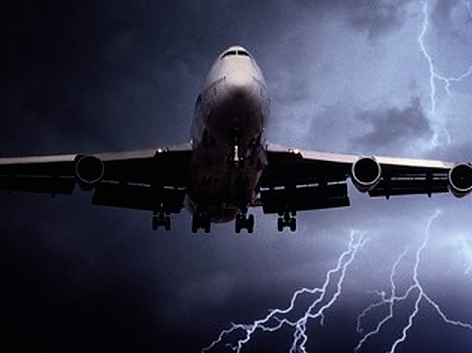www.islandbreath.org ID#0809-27
SUBJECT: AIRLINES COLLAPSE
SOURCE: DAVID WARD sayjaz3@hotmail.com
POSTED: 27 JUNE 2008 - 9:00am EST
Major turbulence ahead for airlines

| by Alexandra Marks on 26 June 2008 in The Christian Science Monitor Industry officials and analysts urge Washington to act to avert a collapse America's aviation system could be at risk of collapsing by the beginning of next year. That warning from aviation experts has prompted some industry leaders to call for re-regulation, something considered almost heresy until now. Others are urging Washington to do more to rein in the oil speculators pushing up fuel costs. But there is agreement among airline officials and analysts that Washington and the two presidential candidates need to recognize the severity of the crisis and take some action now to avert an economically crippling collapse in the near future. "Unless something is done to move toward some kind of fix, we're going to see every one of our major airlines in bankruptcy," says Robert Crandall, former chairman of American Airlines. "If that isn't enough of a crisis to alert everybody, then I don't know what it will take." As a result of the spike upward in oil prices, almost every major airline is now losing millions of dollars each quarter. Unless the price of oil comes down, most are expected to run out of cash by the end of this year or the beginning of next. In a bid to stave off bankruptcy, they're already retrenching. They plan to lay off an estimated 25,000 employees, park hundreds of planes, and cut the number of flights they offer. In addition, a recent study by the Business Travel Coalition, which represents corporate travel managers, estimates that 100 regional and 50 major airports nationwide will lose some of or all their air service by the end of the year. "I've been trying to turn on the emergency sirens to raise awareness in Washington and back home," says Kevin Mitchell, chairman of the Business Travel Coalition in Radnor, Pa. "And I think people are finally beginning to [wake up]." Airline officials visit Washington Representatives of the major carriers were in Congress this week, urging action to discourage speculation in the oil markets. Some analysts blame that speculation for the almost doubling of the price of jet fuel in the past year. Fuel costs used to be the airlines' second-largest operating expense behind personnel costs. Now it's their top expense, accounting for between 30 to 50 percent of airlines' operating budgets, according to the Air Transport Association, which represents the major carriers. The airlines are hindered by several things in hiking prices to offset fuel costs: First, they sell most of their tickets in advance, so most people flying this summer are using tickets that were bought before the recent jump in oil prices. So most of the time that planes take off this summer, the airlines will lose money even when the planes are packed. The major airlines are also constrained by stiff competition from low-cost carriers like Southwest, as well as by the fear that if prices go too high, people will simply stay home. The solution, from the point of view of the major airlines, is to bring the cost of oil down. "What we're looking for in the short term is for Congress to stop this speculation so we can get fuel prices down to a manageable level," says David Castelveter, spokesman for the Air Transport Association. "In the long term, we'd like to see the modernization of the air-traffic control system so we can continue to find ways to reduce our fuel burn." But some aviation analysts say that is not nearly enough. For one thing, not all economic analysts believe that speculation is the primary culprit in the hike in oil prices. They argue that a major factor is concern about demand outstripping supply because of things such as the roaring economies in China and India and the political violence in Nigeria. These analysts are skeptical that reining in speculation will have much impact on oil prices. If oil remains at about $130 a barrel, it will dramatically alter the industry's economic operating model, some aviation analysts say. Then, they argue, it will be crucial for the government to step in and re-regulate certain aspects of the way airlines operate. "If fuel is going to stay there, we're going to have to shrink the industry by 30 or 40 percent," Mr. Mitchell says. "At a minimum, the government needs to help manage that shrinking process.… Otherwise, there'll be no guarantee that you can get from here to there." Other issues: delays, poor service But instead of just focusing on this immediate crisis, Mitchell and Mr. Crandall point to the record delays and deterioration in service overall. It is crucial, both say, that government and industry leaders step back and have a debate about the aviation system's priorities and how best to improve and manage its efficiency and viability. "Every major airline is losing huge amounts of money with service standards that are unacceptable, to be generous," Crandall says. "We need to have a national transportation policy: The nation's whole transportation infrastructure is failing, and our government has no plan." But the major airlines are opposed to any new regulation. "We think de-regulation has been extremely beneficial to the passengers and communities that have service today," Mr. Castelveter says. "It has allowed for competitive growth and for fares that are lower than they were in a regulated market." Some aviation analysts also oppose any attempt to re-regulate the system. They point to the success of Southwest Airlines and other low-cost carriers. They contend that better airline management and improvement of the air-traffic control system could solve some of the system's worst problems. "Let's make sure the air-traffic control system is accommodating all that it can accommodate, and it sure ... isn't doing it now," says Aaron Gellman, an aviation analyst at Northwestern University's Transportation Center in Evanston, Ill. Professor Gellman and others are also concerned that imposing even a small amount of regulation will lead to higher prices and an even less efficient aviation system. "Once you let that camel's nose in the tent, it's going to set up housekeeping," says Michael Boyd, president of The Boyd Group in Evergreen, Colo. "Deregulation has worked OK, and the airlines will adjust to these oil prices. We can get through this." |
SUBJECT: AIRLINES COLLAPSE
SOURCE: DAVID WARD sayjaz3@hotmail.com
POSTED: 20 JUNE 2008 - 9:30am EST
Fuel costs change airlines flight plans

image above United Airlines stewardess chats in a simulated cabin of a Douglas DC-10, in 1968
by David Armstrong on 17 June 2008 in www.Aviation.com |
see also:
Island Breath: Waning of commercial aviation 6/4/08
Island Breath: End of Air Travel 5/1/08
Island Breath: Aloha to Aloha Air 4/14/08